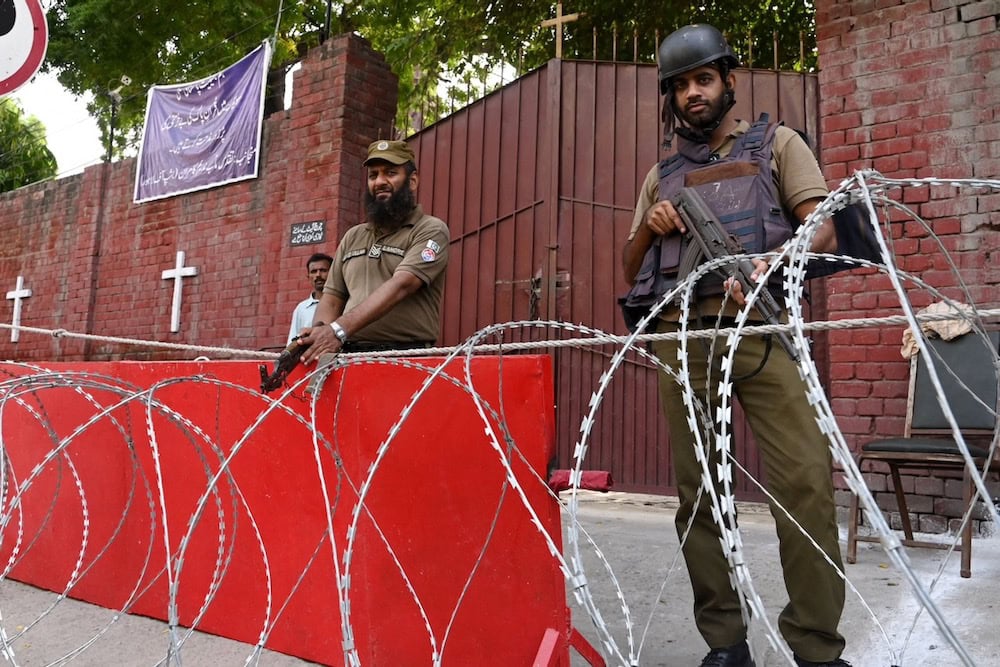Pakistan: Report looks into blasphemy prosecutions and online religious expression
Bytes for All (B4A)
25 April 2024

Police officers stand guard outside a cathedral during a Sunday service, in Lahore, Pakistan, 20 August 2023, after a mob attacked several Christian churches over blasphemy allegations. ARIF ALI/AFP via Getty Images
Report highlights that the rise of the internet has led to an increase in blasphemy prosecutions in the country.
This statement was originally published on pakvoices.bk on 19 April 2024.
A new report by Bytes for All, Pakistan, a leading digital rights organization, sheds light on the concerning rise of online blasphemy cases in Pakistan and the ongoing legal challenges. Titled “State of Online Blasphemy Cases and Unfolding Legal Saga”, the report delves into Pakistan’s legal framework surrounding blasphemy and its impact on online religious expression.
The report highlights that the rise of the internet has led to an increase in blasphemy prosecutions in Pakistan. Social media platforms are often used to disseminate allegedly blasphemous content. The misuse of blasphemy laws has a chilling effect on freedom of expression online. Religious minorities are particularly vulnerable to blasphemy accusations.
Pakistan’s constitution guarantees freedom of speech, but restricts speech deemed offensive to religious sentiments. The penal code includes blasphemy laws, criticized for misuse and abuse, enabling prosecution for online content deemed to disrespect Islam. The report emphasizes a concerning surge in online blasphemy prosecutions in Pakistan with the internet’s rise. Social media platforms are identified as a common hotspot for the spread of alleged blasphemous content. The report underscores the misuse of blasphemy laws as a barrier to free religious expression in online spaces. Individuals expressing themselves freely online risk facing blasphemy accusations, fostering a climate of fear and self-censorship.
The report underscores the particular vulnerability of religious minorities, including Hindus, Christians, and Ahmadis to blasphemy accusations. Ahmadiyya, a faith based group, not recognized as Muslim by the statute, are targeted specially, as documented in this report.
The report urges the Pakistani government to undertake a legislative reform to ensure blasphemy laws comply with international human rights standards. The report further emphasizes the need for measures safeguarding religious minorities from baseless blasphemy charges, including establishment of a redress mechanism enabling blasphemy accused to access legal remedies, for example, lawyers.
The report is available at: https://bytesforall.pk/publication/state-online-blasphemy-cases-and-unfolding-legal-saga
Bytes for All (B4A)
25 April 2024

Police officers stand guard outside a cathedral during a Sunday service, in Lahore, Pakistan, 20 August 2023, after a mob attacked several Christian churches over blasphemy allegations. ARIF ALI/AFP via Getty Images
Report highlights that the rise of the internet has led to an increase in blasphemy prosecutions in the country.
This statement was originally published on pakvoices.bk on 19 April 2024.
A new report by Bytes for All, Pakistan, a leading digital rights organization, sheds light on the concerning rise of online blasphemy cases in Pakistan and the ongoing legal challenges. Titled “State of Online Blasphemy Cases and Unfolding Legal Saga”, the report delves into Pakistan’s legal framework surrounding blasphemy and its impact on online religious expression.
The report highlights that the rise of the internet has led to an increase in blasphemy prosecutions in Pakistan. Social media platforms are often used to disseminate allegedly blasphemous content. The misuse of blasphemy laws has a chilling effect on freedom of expression online. Religious minorities are particularly vulnerable to blasphemy accusations.
Pakistan’s constitution guarantees freedom of speech, but restricts speech deemed offensive to religious sentiments. The penal code includes blasphemy laws, criticized for misuse and abuse, enabling prosecution for online content deemed to disrespect Islam. The report emphasizes a concerning surge in online blasphemy prosecutions in Pakistan with the internet’s rise. Social media platforms are identified as a common hotspot for the spread of alleged blasphemous content. The report underscores the misuse of blasphemy laws as a barrier to free religious expression in online spaces. Individuals expressing themselves freely online risk facing blasphemy accusations, fostering a climate of fear and self-censorship.
The report underscores the particular vulnerability of religious minorities, including Hindus, Christians, and Ahmadis to blasphemy accusations. Ahmadiyya, a faith based group, not recognized as Muslim by the statute, are targeted specially, as documented in this report.
The report urges the Pakistani government to undertake a legislative reform to ensure blasphemy laws comply with international human rights standards. The report further emphasizes the need for measures safeguarding religious minorities from baseless blasphemy charges, including establishment of a redress mechanism enabling blasphemy accused to access legal remedies, for example, lawyers.
The report is available at: https://bytesforall.pk/publication/state-online-blasphemy-cases-and-unfolding-legal-saga

No comments:
Post a Comment